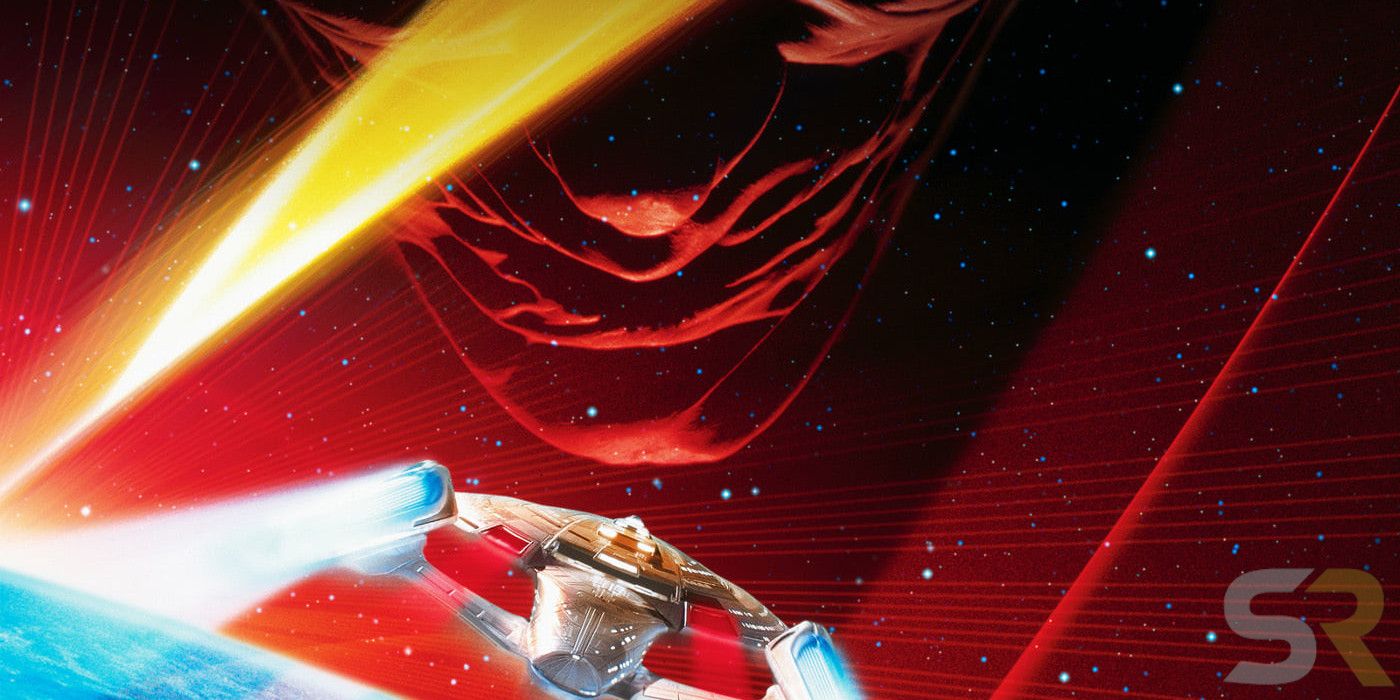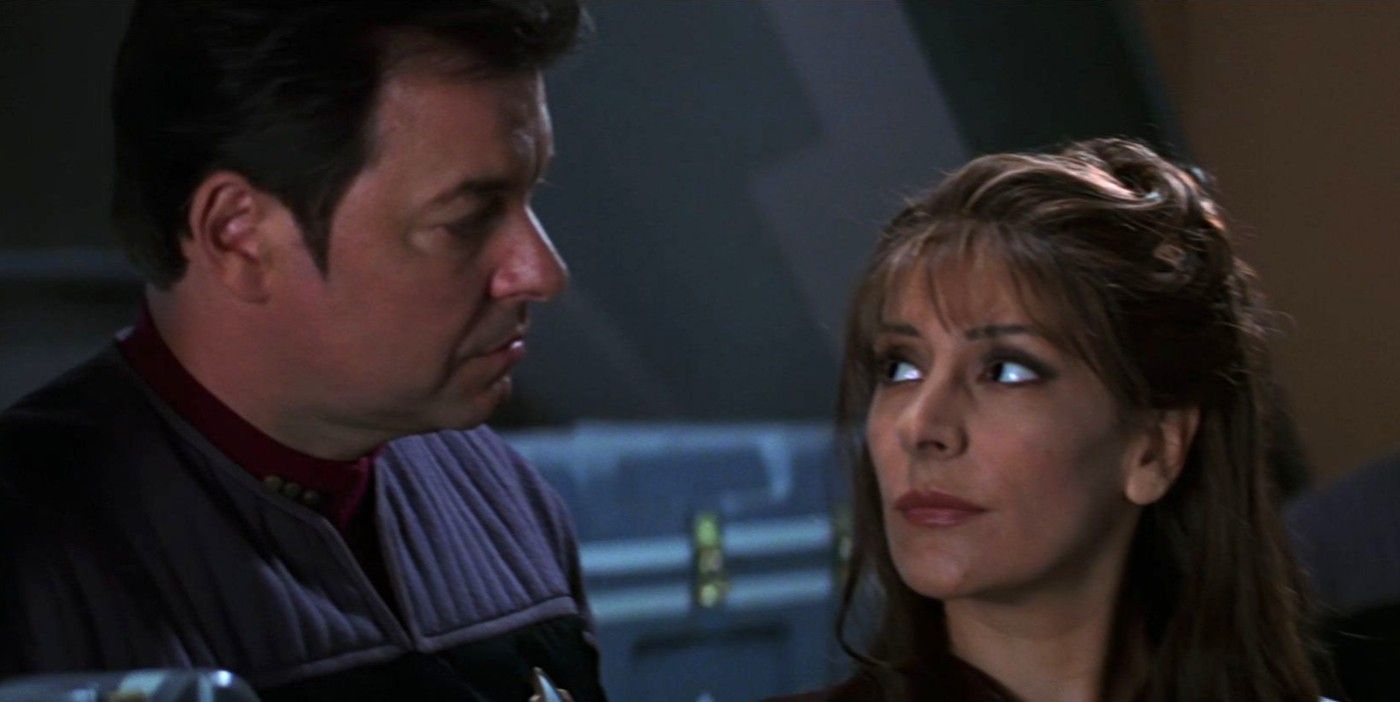Star Trek: Insurrection was a critical and box office disappointment in part because not even the filmmakers agreed on the ethical premise of the movie. Released in 1998 and directed by Jonathan Frakes, Star Trek: Insurrection was the third feature film starring the cast of Star Trek: The Next Generation. Insurrection holds a 55% rotten score on Rotten Tomatoes and grossed $117-million worldwide, a disappointment compared to the previous TNG movie, Star Trek: First Contact. Indeed, Star Trek: Insurrection ranks low on fans' list of Star Trek movies and a big reason is a confusion over its main moral issue.
In Star Trek: Insurrection, the U.S.S. Enterprise-E is called into a region of space called the Briar Patch, where Captain Jean-Luc Picard (Patrick Stewart) learns the United Federation of Planets is working with a race called the Son'a to gain control of a planet belonging to the Ba'ku. The Briar Patch emits "metaphasic particles" that are keeping the Ba'ku from aging; essentially the planet is a virtual Fountain of Youth. Picard learns Starfleet Admiral Dougherty (Anthony Zerbe) and the Son'a's leader, Ru'afo (F. Murray Abraham), plan to forcibly relocate the Ba'ku from their planet and take command of the Briar Patch. Picard goes against this plan for moral reasons; he and the Enterprise's crew decide to commit insurrection and defend the Ba'ku. Ru'afo betrays and kills Dougherty and, after battles on the planet and in space, Picard and the Enterprise destroy the Son'a's collector ship, killing Ru'afo and saving the Ba'ku from the Son'a, who are revealed to be former Ba'ku themselves.
On paper, Star Trek: Insurrection brings the type of ethical quandary that distinguished the best TNG episodes; in fact, Trekkers immediately recognized the story's similarity to the TNG season 7 episode "Homeward". In Insurrection, Dougherty argued the Briar Patch's regenerative properties could benefit billions of lives in the Federation, potentially curing disease and prolonging the lives of its citizens. This is one of Star Trek's most famous core principles made famous by Spock (Leonard Nimoy): "the needs of the many outweigh the needs of the few." However, Picard argued that removing the Ba'ku against their will was wrong and he risked the careers of himself and his crew for the lives on 600 Ba'ku on ethical grounds. The film made Picard's stance go down easier since Admiral Doughtery was acting in an insidious manner alongside the Son'a, so they were clearly villains, but the unresolved central question of whether it was right for Picard to place the rights of 600 Ba'ku over the untold billions of people who the Briar Patch's metaphasic particles could help hangs over the movie.
In his review of Star Trek: Insurrection, the late film critic Roger Ebert interviewed the cast and found that even they didn't side with the film's solution to its central ethical problem. When Ebert asked Jonathan Frakes whether it was right to sacrifice the Ba'ku to save billions of Federation lives, the director replied, "I think maybe I would." Brent Spiner, who plays Commander Data, added, "Absolutely! think I raised that question more than once." Donna Murphy, who played Picard's Ba'ku love interest Anji, confessed, "I had to be very narrowminded to serve the character." Captain Picard himself, Patrick Stewart, agreed: "You've got to be flexible. If it had been left in the hands of Picard, some solution could have been found." The cast disagreeing with the actions of their characters helps explain why Star Trek: Insurrection feels so half-hearted and unsatisfying.
The screenplay by the late TNG executive producer Michael Pillar was also confused; Pillar sought out to tell a darker Picard story inspired by Joseph Conrad's "Heart of Darkness" but Paramount wanted the third TNG film to be more lighthearted, citing the enduring popularity of Star Trek IV: The Voyage Home, which was the most successful Star Trek TOS movie. The studio also demanded more action akin to the exciting battles against the Borg in Star Trek: First Contact. While Star Trek: Insurrection has enjoyable comedic moments with the Enterprise crew, the film marked a clear downturn in the quality of the TNG movies that began to drive Trekkers away and started the Star Trek franchise's descent into cancelation in the mid-2000s.


